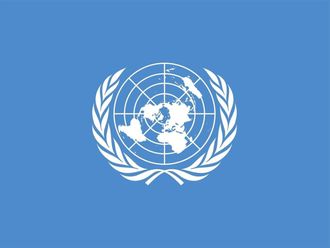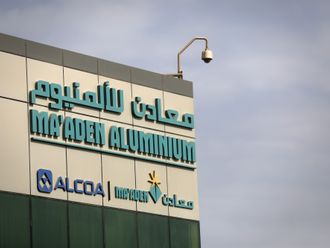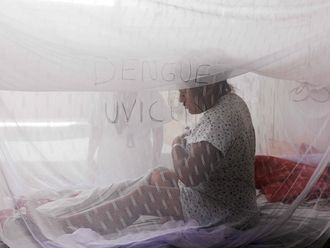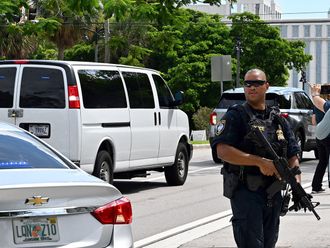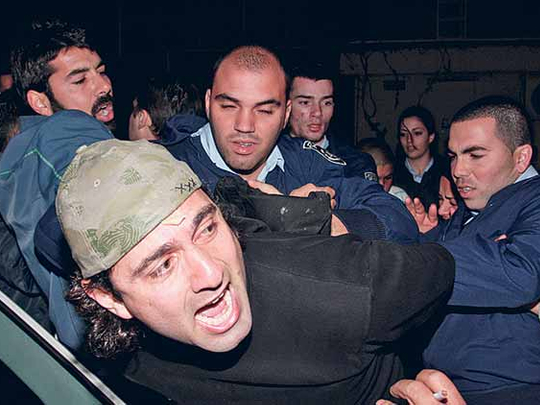
Tel Aviv: The film Ajami was already getting a fair amount of press after being nominated this month for an Oscar in the Best Foreign Language Film category.
But the film and the violent, crime-ridden neighbourhood it portrays just became an even hotter topic after two brothers of filmmaker Scander Copti — one of whom was also in the film and served as his production manager — were arrested following a run-in with the police.
The brothers, Tony Copti and Jieres Copti, who allege they were beaten and mistreated by the police during their arrest over a week ago, filed a complaint against the Israeli police last Monday, charging brutality.
"We have photos of how the police treated us when they arrested us, but it was only after they took us to the police station that they really started to beat us," Tony Copti, who acted in the film and served as its production manager, said.
The Tel Aviv District Police issued a statement about the arrests: "This was an unusual incident of an assault on officers who arrived at a scene of a crime and were attacked by dozens of local residents who beat them and cursed them.
"Reasonable force was employed in order to keep the order and arrest suspects."
Justice expected
"We hope that they will investigate this and that justice will be done," Copti said. "This kind of thing happens a lot in Jaffa — there was a similar incident just two weeks ago. We had a big meeting of all the communities in Jaffa to talk about it.
"Everyday we have incidents with the police. We hope something will change."
Tensions between the Arab residents of Jaffa and the Israeli officers sent in to police them have been a factor of life in the Jewish state for many years.
Several residents interviewed for this article — some of them actors in the film — say that police aggression towards them is an ongoing problem that Ajami only touches upon briefly.
But the strength of the film is that it doesn't try to portray a one-sided view of the tensions in which disempowered Arabs and Palestinians are victims and the Israeli Jews are the aggressors.
Rather, the film shows the multi-layered conflict in a way that blurs lines of right and wrong, and shows the humanity of all its flawed, lovable characters.
Some examples
For example, there is a teenage Palestinian from the West Bank who has smuggled himself into Jaffa illegally to work in a restaurant in the hope of making enough money to help save his ailing mother — and inadvertently winds up in the middle of a drug deal gone wrong.
And there is an Israeli cop who, having just lost his brother — a soldier who was abducted and killed outside of Nablus — cracks and shoots the young Palestinian he should have simply arrested.
The film also touches on the social complications of life for the approximately 20 per cent of Israel's citizens who are Palestinians of 1948 areas from forbidden romances between Jews and Arabs — as well as between Muslims and Christians — to blood feuds, which put innocent people in the line of fire just because of their family affiliation.
Source of crime
But the overriding current of the films pulses with the lure of drugs: as a source of crime, as an economic outlet, as ultimately, a path toward destruction.
Although he's a friend of filmmaker Scander Copti, Sami Abu Shahadeh looks at Ajami with a critical eye.
Jabali, a Jaffa native who's doing a doctoral thesis on the city's history at Tel Aviv University, notes that the film starts in the present day and doesn't give any background as to how Ajami got to be a poor, crime-ridden neighbourhood.
He attributes this to the upheaval of 1948 when 97 per cent of Jaffa's residents were expelled or fled.
Previously, he said, Jaffa was considered the Arab cultural centre of British Mandatory Palestine.
Now, it was reduced to a ghetto — and many lost access to property they'd owned before the war.
"One of the problems with the movie is that there is no historical context to describe how Ajami got to be a neighbourhood of drugs, poverty and crime," Abu Shahadeh said.
"But they made this, initially, as a community project — to bring empowerment to the neighbourhood itself.
"It was a small project with almost no budget and no serious actors. It was never planned to be big or definitive from the beginning, so they didn't take into consideration all the implications of the movie."


